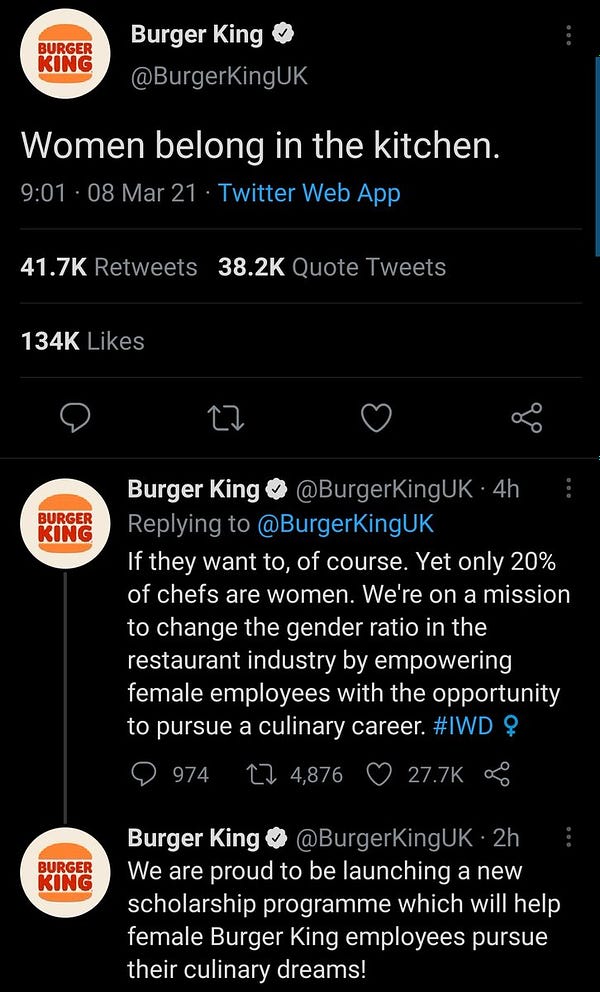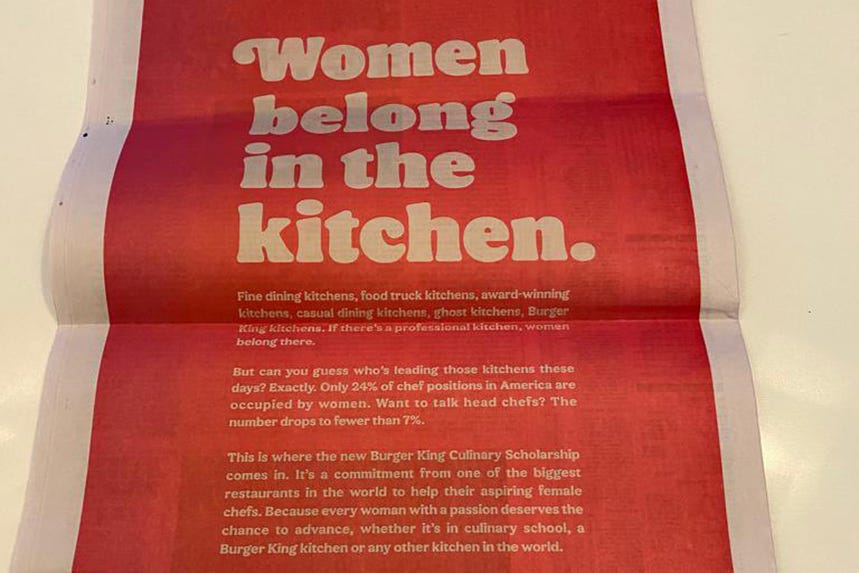Borkowski Weekly Media Trends 12-03-21
A bad week for women | Burger King | Society of Editors | HuffPost UK
International Women’s Day came on a bad week to be a Woman
It has been a horrible week to be female. Our social media feeds and newspaper headlines had barely paused their attacks on a young woman who dared to speak her truth in order to spout some #InternationalWomensDay platitudes, when a story broke that resonated with every every womxn in the country. Today police have confirmed that the remains of Sarah Everard, the young woman missing from South London, have been found.
It is a tragic, unbearable story. We have all been Sarah at one point. Every woman has walked back late at night, keys clutched between our knuckles, changing our route to make sure we’re not followed, telling ourselves we’re being paranoid. And yet the media narrative and public discourse still insists on focusing on what we, as women, should do to stop men from acting in this way.
To change this rhetoric, we first need to reform our attitudes, our culture, and instead of asking what women should do to make themselves safer, ask what men need to do to stop themselves attacking and intimidating women. As always new and traditional media tell two different stories here.
A popular Twitter thread started by a Clapham local, Stuart Edwards, sought advice on what men can do to help. It received thousands of responses and kickstarted a conversation across the UK, one that in many households was probably happening for the very first time.

THIS is how we change the rhetoric – switching the onus onto men rather than stating that too many women are being attacked without stating who is responsible.
Multiple major media outlets’ response? Hysterical stories misleadingly claiming that men are being threatened with a 6pm curfew. There’s a long way to go until the default is a national newspaper headline reads ‘too many men are attacking women’.
Burger King’s Reverse Trolling Flops
On International Women’s Day, Burger King seems to have taken their luck with risky PR too far. Burger King tweeted ‘Women belong in the kitchen’, with additional copy below announcing that was why they were starting a scholarship program designed to help women follow their culinary dreams. Despite the progressive ambitions of the programme, and their intention of pointing out that only 20% of chefs are women, the stunt fell flat. Some saw it as ‘reverse trolling’, while others saw it as a gratuitous shock tactic, especially inappropriate to the spirit the day.


KFC quickly called on them to delete the tweet, and subsequently Burger King did so with the now de rigueur note of apology ‘we promise to do better’. This flop points out the weakness of the adage that ‘anything that gets your attention and makes you think about a brand for more than 2 seconds is a success’. It also a reminder that content that works on one channel won’t always work on another. In this case, Burger King ran a banner ad in the New York Times which, because of the layout, reads much better than the clickbait version on Twitter.
On Twitter, the grabby headline is isolated from the rest of the copy. They might have assumed that they could ‘generate clickthrough’ by generating outrage, but it was precisely the bad faith with which they took advantage of a sexist trope that made it offensive to many. A good lesson for our profession: PR teams need to tailor content to be channel-specific rather than developing an idea for one format and copy-pasting it into another.
Meanwhile, the IDF celebrated international women’s day with some reverse trolling of their own.
Society of Editors failings exposed by Harry & Meghan Response
The consensus among commentators is that the UK press was the primary target of the artist formerly known as Prince Harry’s invective during the Oprah interview; his family’s principal crime was their failure to protect his wife from what he depicted as an (almost literally) murderous cabal.
This narrative raised valid questions about race as a motivation for the British press’ vendetta against Meghan Markle. Moreover, with even her Maj’s people signalling that they are taking accusations of institutional racism in the interview seriously, one might have expected an earnest response from the media’s governing bodies.
The Society of Editors went in another direction, issuing a particularly dismissive…dismissal of suggestions that the organisations they represent have a racism problem.
Then came the avalanche; beyond the perceived arrogance of the initial statement, virtually all-white organisations are in no position to be making sweeping proclamations about race (we discussed how this weakened the HFPA’s defence of their almost-equally white Golden Globe nominations).
To compound this, it quickly became even clearer that the SoE didn’t represent the unified voice of the UK press community, with over 200 prominent journalists of colour signing an open letter rebutting the initial statement, many elaborating on their position by publicising excoriating critiques of the organisation to their substantial social media following.
Then the formidable Charlene White quit as host of the SoE-organised National Press Awards amid a spate of withdrawn nominations.
The climbdown was all-the-more embarrassing for the SoE’s initial belligerence. Having driven this approach, Executive Director Ian Murray resigned stroppily on Wednesday, with the board having by then released a more conciliatory clarification to undermine his initial statement. Then we learned that the National Press Awards are set to be postponed due to the scandal. A barely-mitigated disaster.
Without intending this as an ‘After School Special’ it’s worth considering some of the rules of crisis comms the SoE broke:
1. Don’t use inflammatory language.
2. Ensure that everyone you speak for is unified and on-message.
3. Ensure that you have support from every audience segment affected by your communications.
4. ‘Read the room’ on every channel through which you are planning to communicate.
This week was a textbook example of what happens when an organisation under fire does none of the above. Harry must be laughing his head off.
Another day in the death of digital media
It’s been a difficult ride for digital media over the past couple of years, and with the recent news that HuffPost UK’s news operation is shutting down, the future is looking bleak for the once booming digital news era. Covid-19 has clearly sped up HuffPost’s decline, but what’s really caught people’s attention is the way the outlet’s owner, BuzzFeed, broke the news to their UK staff. Having also laid off 47 HuffPost workers in the US, CEO Jonah Peretti has faced criticism for his brutal methods.
It’s been poorly managed, with the delivery of the announcement showing a lack of empathy. The UK team’s female staff have been disproportionally affected, particularly mothers. Reportedly “Every mother on the UK editorial staff has been told they face losing their job, including one person on maternity leave”. Informed via email, most are unclear of their futures with the news organisation.
BuzzFeed has clearly taken advantage of a UK employment discourse dominated by NHS wages – announcing cuts to the UK team shortly after a US announcement that was widely criticised. In a callous move, Peretti hosted an international meeting outlining cost cutting measures, setting the password for entry as “spr!ngisH3r3”…
This episode may have been inevitable but sadly BuzzFeed’s thoughtless dismissal of staff will be quickly forgotten in the wider conversation of Covid related job cuts, particularly those in the media.



